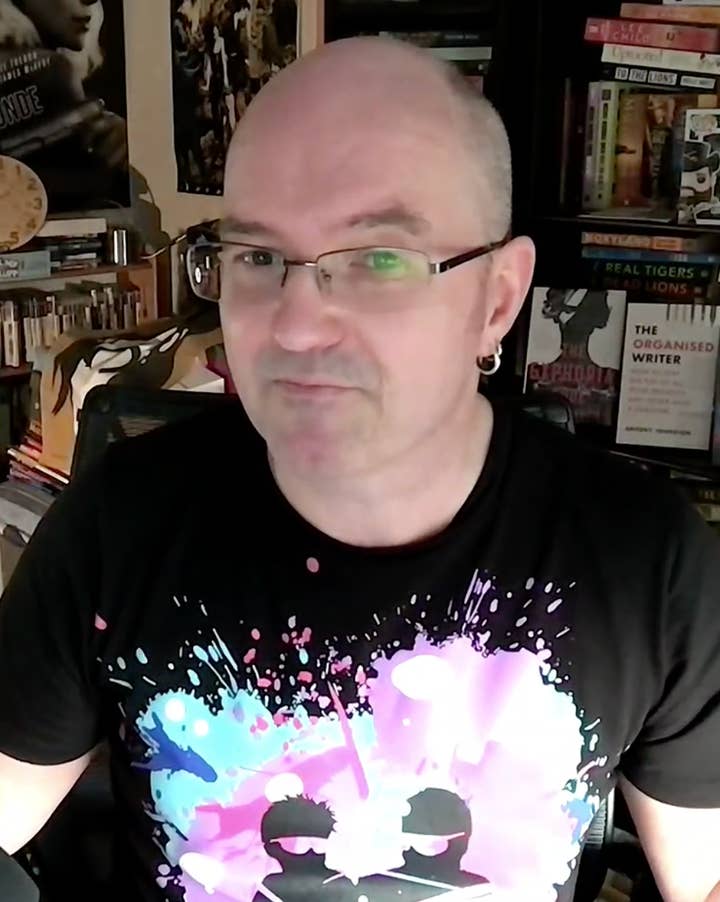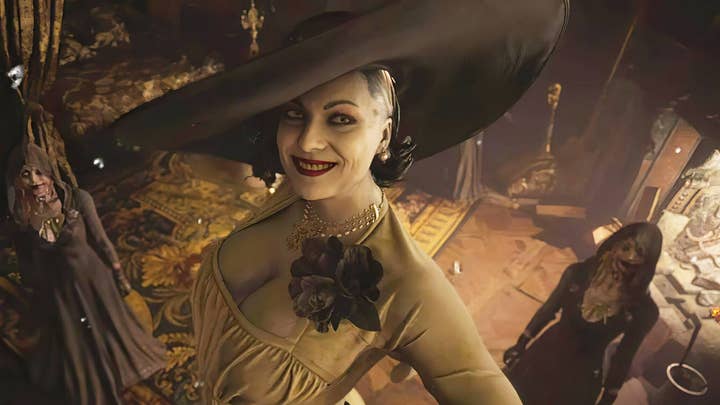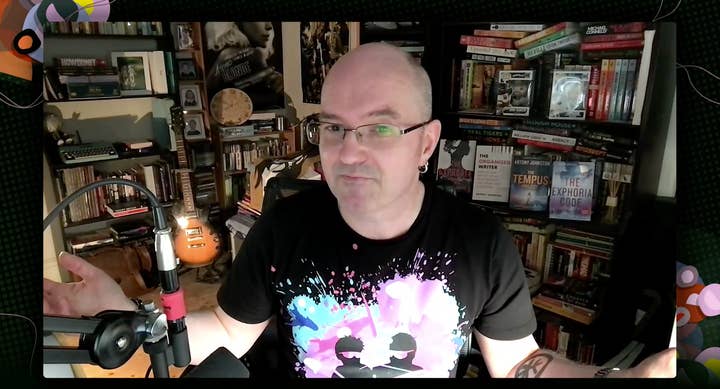How (and why) games can adopt the TV writers' room approach to craft their stories | GDC 2022
At GDC 2022, Antony Johnston looked into the benefits of this model and why games' writing teams should embrace it
At GDC 2022 this week, comics and games writer Antony Johnston gave a talk about how to run (and survive) a writers' room.
In the games industry, Johnston is known for his work on Resident Evil: Village, Middle-Earth: Shadow of Mordor and ZombiU, among others.
In his talk, which was part of the event's Game Narrative Summit, Johnston made a case for running games' writing teams the same way TV showrunners lead writers' rooms.
"In TV, the writers' room is both a physical space and a methodology," he explained. "The room is populated by a number of writers with different skill levels and experience. One of those writers, sometimes two, is the showrunner. Normally, the showrunner also wrote the pilot script and has a vision for how it can become a series. So they assemble a room, communicate their vision to the writers who brainstorm ideas for that series, condense those ideas into stories that can become a season of TV, and then write, revise and polish the scripts for episodes.
"The benefits can be enormous, in particular the sense of teamwork and camaraderie it builds"
"What's important is that almost all of that is done collectively, in collaboration as a room. And that is one of the big ideological points of this method. So why has TV worked this way for decades, and now even movies are starting to do it as well? Because it works. Whether it's for a whole season of TV or just a few weeks, the writers' room is valuable. Now, that's worth noting because it's one of the ways games can take this idea and make it our own."
The difference between a traditional writing team and a writers' room is that the latter has a "flatter structure and less rigidly defined roles," he said.
"There is a single leader, but everyone else's duties can -- and often will -- change from day-to-day according to what the showrunner determines needs doing. One day you might write the script for a cutscene, the next you might write the character's backstory and bio, and the next the whole room might spend all day brainstorming ideas for a story arc. This requires flexibility and agility on everyone's part, but the benefits can be enormous, in particular the sense of teamwork and camaraderie it builds.
"Now, at this point, some of you may think, 'Well, actually we already do things this way' and if so, congratulations. But names are important. And we also know that names can influence how people think about things. So if you're already doing this or if you come away from this talk thinking, 'We should definitely do this,' I encourage you to own it and call yourself a writers' room. It can alter perceptions and make a big difference to the work you get done, and even how that work is received by your non-writing colleagues and clients."
Johnston articulated his talk around five pillars, which are the five aims of a writers' room, and can help the industry set new standards for how narrative work should be approached in games:

1. Assemble a staff of good writers
Johnston's first section revolved around how to approach recruitment for a writers' room. His first piece of advice was to avoid rushing through the process and hiring last minute, as it inevitably leads to hiring the wrong people or not having the right mix of writers. The dynamic between different kinds of writers is also a crucial aspect.
"The best rooms feature a diverse variety of voices, styles and points of view," Johnston said. "Now, I use the word diverse deliberately. Yes, you should put in the effort to hire writers who are not cis het white men, and it's for the same reason that you should also hire writers who are diverse in their experience, resumes, approach, style and personality.
"Hiring a room of writers who are all the same or, worse, who all basically think like you is pointless. It defeats the main reason to have a writers' room, which is bouncing ideas off each other and working collaboratively to create something greater than the sum of its parts."
He highlighted four types of diversities that you should think about when hiring:
- Diversity of experience (how long have they been in games?)
- Diversity of resumés (what type of games have they worked on?)
- Diversity of approach (how do they work?)
- Diversity of personality (can we get along?)
"Yes, you should put in the effort to hire writers who are not cis het white men. Hiring a room of writers who are all the same or, worse, who all basically think like you is pointless"
"Ideally you want at least one veteran, someone who has seen everything the industry has to offer and lived to tell the tale," he detailed. "You should also try to hire at least one junior, someone either brand new or very inexperienced. This is often how you'll find those writers from marginalised communities and you can help them gain experience to become the veterans of tomorrow.
"And it's not purely altruistic; junior writers can be a source of insight and ideas that the more battle-scarred among us simply wouldn't consider. In between those two extremes, fill the room with solid midfielders, writers with good track records but who aren't household names."
Similarly, hire at least one writer who is a specialist of your genre, but for the rest of the room it's more about the type of games they previously worked on, in terms of size, style and budget.
Diversity of approach can be "more tricky to gauge," he continued, advising to talk to people who have worked with your prospective candidate to know a bit more about them, or simply ask them directly. Johnston also likes to present them with hypothetical situations to gauge their approach.
"I like to present candidates with several very different high concepts in the relevant genre, let them pick their favourite and tell me how they'd approach it," he explained, adding that it's crucial to get to know writers before hiring them.
2. Create a space for ideas to flourish
Next, Johnston detailed how to actually run the writers' room so it's a safe space for everyone. Establishing ground rules from the get go is very important, he pointed out, before detailing his own principles:
- Nobody stands on ceremony: "You may be head writer, but if the junior writer thinks your story idea stinks, they must feel comfortable enough to say that and you should positively encourage them to do so. When you're brainstorming or discussing story solutions, try to keep the room as flat as possible."
- Don't wait for good ideas: "If you're trying to figure something out and someone else has an idea, you want them to offer it up, even if they don't think it's a very good idea. Because sometimes discussing and dissecting bad ideas is what leads to two good ideas, so nobody should feel bad or be criticised for thinking out loud and voicing their ideas."
- My virtual door is always open: "Part of a head writer's responsibility is to be a sounding board and a source of knowledge. Your staff will have follow-up questions or sometimes things they want to discuss outside of the room, and you should be there for them. You do not get the privilege of not being interrupted."
- Don't be a dick: "Doesn't need an explanation, but it does sometimes need reiterating."
Looking at the day-to-day organisation, Johnston pointed out that this is where a writers' room for games may differ from TV: "In TV, the showrunner has the vision. Everyone else's job is to interpret and support that vision and work to make it a reality. In games, as always, it's more complicated."

As head writer, you typically support someone else's vision, whether that's the creative director, narrative director, or the studio head. Johnston referred to these roles as "the producers" throughout the talk as a convenient catch-all term.
"Your job as head writer is to communicate the producers' vision to the writers' room and lead them in that direction. You are the bridge between the producers and the writers. So the first thing you should do is absorb the producers' vision. In TV, that's easy because the showrunner normally wrote the pilot script, but in a game situation where someone else is the visionary or development is already underway, you need to learn the material so that you can communicate the vision to the writing staff and they can trust that you're leading them in the right direction."
Get into the habit of having daily check-ins with your writers to see what they're working on, ask if there are problems, and be clear about what's coming.
"Don't make it complex but do it every day," Johnston said, adding that it's crucial that the whole room knows the team's goals and what they should be doing, and it's the lead writer's role to keep everything in check and communicate clearly.
Give as much creative freedom as possible on first drafts and have a shared online folder so everyone in the writers' room can read everyone else's work.
"That can be intimidating to some, but it is a really great way to build that sense of teamwork in the room, not to mention maintain continuity and coherence without them having to consult you over every single point of lore," he said.

3. Encourage collaborative brainstorming
Johnston went on to talk about what he considers one of the main strengths of a writers' room and something "that any project with a decent narrative component will need": breaking story.
"Not all sessions are the same," he said. "Sometimes you need to simply brainstorm, throwing out ideas, until something sticks. Sometimes you'll have already done that or you'll be working with existing ideas, but now you need to mould those ideas into the bullet points of a story.
"That is where the writers' room shines, bringing the collective imaginations of the writers together to come up with concepts that none of you would have achieved alone"
"Whether you're figuring out a plot, a timeline, a story arc, a character backstory, a fantasy religion, a sci-fi society, that is where the writers' room shines, bringing the collective imaginations of the writers together to collaborate, generate ideas and come up with solutions and concepts that none of you would have achieved alone."
But room sessions like this can also be chaotic, he noted, before providing tips on how to make the discussion run smoothly:
- Assign a note taker: Have the session's notes taken by whoever's going to write up the results, and if several writers are going to be working on the material, everyone needs to take the notes that are relevant to them.
- Stay on target: While side chat can be valuable as it can spark new ideas, you need to keep in mind the goals of the session and refocus everyone's minds on the task when needed.
- Stand back: Be careful not to dominate the conversation yourself, put your ego aside, let other people have the big ideas.
- Encourage the quiet ones: Incite young and new writers to contribute. Veteran writers shouldn't dominate the conversation.
- Quit while you're ahead: These sessions can be mentally exhausting, keep an eye on everyone's energy levels; keeping everyone in the room for the sake of an arbitrary clock is a bad idea, so it's often better to call it a day.
4. Produce consistent unified material
In any writers' room, it's crucial that the work produced is consistent so it feels like it's been written by one unified voice. In order to do so, Johnston said to make sure you take advantage of everyone's strengths, but also throw curveballs from time to time.
"If you hired right, you'll already have an idea of each writer's skills, strengths and weaknesses. One writer might be great at generating raw ideas but their execution of those ideas maybe isn't so hot. But by contrast, you may have a writer who's quiet when it comes to the ideas, but is great at taking someone else's and really working through [them].
"None of us is the perfect all-round writer. The key with every writers' room is balancing those skills, habits and tendencies. So that the room collectively becomes that unified, harmonious, fully rounded writer. But every now and then don't be afraid to throw people a curveball and challenge their creativity. Give them assignments outside their creative comfort zone."
"None of us is the perfect all-round writer. The key with every writers' room is balancing those skills, habits and tendencies"
An inherent part of producing that unified content is rewrites, which Johnston said is "fundamental to the philosophy of the writers' room." It is vital that the words produced feel "tonally and stylistically" similar, but it's not realistic to just ask everyone to write the same way -- you hired these writers for their diversity after all.
"That's where you come in," he continued. "One of the head writer's most important tasks is to, potentially, rewrite everything before it goes to the producers. Not just to fix typos or errors in the lore, but to make sure all the material has a consistent tone and style that fits the creative vision. By doing so you lift that burden away from your writing staff. You free them to be creative and fearless because you're their safety net.
"If they write something that doesn't fit, you simply won't let it go to the producers, you'll either tell them to rewrite it or you're rewriting it yourself. Now let's be clear: you should not wield what we call a 'heavy pen'. Don't rewrite material just because it's not exactly what you would have written. You must let your staff express themselves creatively. If there are strict content requirements, hammer those out in the room beforehand and make them part of the assignment brief. If the writer still hasn't followed that brief, sure, send it back to them with notes. But if they have done what's required just in a different way to how you would have done it, leave it be.
"What you should rewrite are things like character voice and lingo, especially if the material is final VO scripts, to ensure that everything really is consistent. But before you reach that stage, when you're world building, writing bios, internal lore documents and so on, try to keep a light touch."
Johnston added that you should always be transparent about the edits you're doing, and highlighted the importance of not being "a credit hog."
"You don't need to take credit for every single word, even if you've rewritten it extensively, just because it came out of your room," he said. "It all reflects on you anyway, that's how leadership works."

5. Meet the producers' needs
In his conclusion, Johnston touched upon the lead writer's role being the bridge between the stakeholders and the writers' room.
"You meet with the producers, you establish their needs, you return to the room and fulfil those needs by handing out assignments to the writers. Then you take and review their material, send it to the producers, and go meet with them, and the cycle begins again," he explained. "This means you're living in two camps and to an extent you must play the politician, trying to satisfy both sides and weigh up the best way forward."
When meeting with the producers, the lead writer is representing the writers' room. It's a careful line to walk between the pragmatism of what's in the best interests of the project and protecting the creative integrity of your writing staff, Johnston said.
"What this means is that you should advocate for your writers' work as if it were your own," he added. "You must have full confidence in everyone's material so that you can explain and defend it as if you've written it yourself. If there appears to be cracks in the armour, if the producers sense that the room isn't unified or you don't have confidence in your staff, it will diminish their trust in you and their confidence in the work coming out of your room."
"A good mantra to keep in mind is: defend your ideas vigorously, but recognise when someone else has a better idea"
On the other hand, you must present new feedback and assignments from the producers to the writing staff as if these aims were your own.
"Sometimes you and the producers will have argued about those aims and you might have lost that argument," Johnston smiled. "But just like advocating for your staff's work as if it were your own, you must also present the producer's vision as if it was yours. Again, if your staff sense that's not the case, if they can tell you don't really believe in the notes you're giving or the direction in which you're leading them, they won't give you their best work.
"Part of your role as head writer is to insulate your staff from politics, from whatever internal conflicts may be going on between the producers -- because let's be honest, there will be -- so that the writers can just get their heads down, unleash their imaginations and write.
"None of this is easy, being able to present other people's work or notes as enthusiastically as if they were your own is not part of a creators' everyday skillset. But it is something you will need to learn in your role as a head writer. A good mantra to keep in mind in all of these situations is one that I've followed for many years: defend your ideas vigorously, but recognise when someone else has a better idea."
More GamesIndustry.biz Academy guides to Working in Games
Our guides to working in games cover various perspectives, from hiring to retention, to landing the job of your dream or creating the right company culture:

